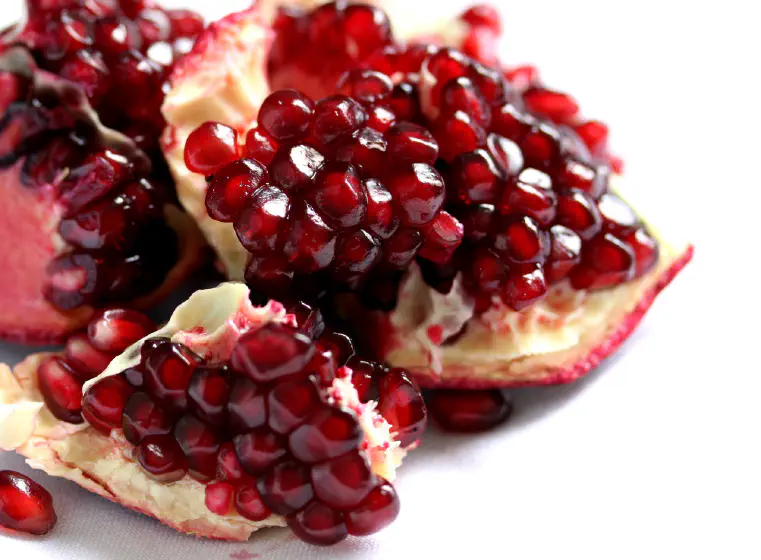
Are you looking for a delicious and nutritious way to boost your health?
Bursting with flavor and packed with an impressive array of health benefits, this intriguing fruit has been celebrated for centuries.
From its ability to lower blood pressure and improve heart health to its potential cancer-fighting properties, the pomegranate truly is a powerhouse of wellness.
So, if you’re ready to uncover the incredible health benefits of this crimson delight, keep reading!
Nutritional Value of Pomegranates
Pomegranates are highly nutritious and packed with essential nutrients, vitamins, and minerals.
They are an excellent source of dietary fiber, providing 7 grams per serving.
Additionally, pomegranates are rich in vitamins C and K, with one serving containing around 30% and 36% of the recommended daily intake, respectively.
These fruits are also a good source of folate, providing roughly 16% of the recommended daily intake.
Furthermore, pomegranates contain a variety of minerals such as potassium, which is important for heart health, and manganese, which plays a role in supporting bone health.
They also contain small amounts of calcium, iron, magnesium, and phosphorus, which are essential for various bodily functions.
Overall, incorporating pomegranates into your diet can provide numerous health benefits due to their impressive nutritional profile.
Health Benefits of Pomegranates
Pomegranates are packed with health benefits.
They are rich in antioxidants, which can help protect the body against damage from harmful free radicals.
These antioxidants have been shown to have anti-inflammatory effects, which may help reduce the risk of chronic diseases such as heart disease, diabetes, and certain types of cancer.
Additionally, pomegranates are a good source of vitamins A, C, and E, as well as folate and potassium.
These nutrients play an important role in maintaining a healthy immune system, supporting heart health, and promoting overall well-being.
The high fiber content of pomegranates also contributes to digestive health and can aid in weight management.
Furthermore, studies have suggested that pomegranate consumption may improve memory and cognitive function, as well as help lower blood pressure and cholesterol levels.
Overall, incorporating pomegranates into your diet can have numerous positive effects on your health and well-being.
Conclusion
In conclusion, pomegranates are incredibly beneficial for overall health and well-being.
They are packed with essential nutrients, antioxidants, and anti-inflammatory properties, which promote heart health, boost the immune system, and improve digestion.
Additionally, their high content of vitamins C and K, along with potassium and fiber, contribute to healthy skin and hair, stronger bones, and improved brain function.
To reap the health benefits of pomegranates, it is recommended to include them in your diet in various ways.
One option is to consume the juicy seeds on their own as a refreshing snack.
Alternatively, pomegranate juice can be enjoyed as a tasty and nutritious beverage.
Pomegranate can also be used as a sweet addition to salads, smoothies, and desserts.
With their delicious taste and numerous health advantages, adding pomegranates to your daily diet is a simple and enjoyable way to enhance your overall well-being.
FAQs
What are some of the health benefits of eating pomegranates?
Pomegranates are packed with antioxidants that help protect against free radicals and reduce inflammation.
They can improve heart health by lowering blood pressure and cholesterol levels.
Pomegranates also support digestion, boost the immune system, and have anti-cancer properties.
Additionally, they can aid in weight management and improve overall skin health.
How often should I consume pomegranates for health benefits?
There is no specific frequency for consuming pomegranates for health benefits.
Incorporating them into your diet regularly can help maximize their potential health benefits.
Are there any side effects of eating too many pomegranates?
While pomegranates are generally safe to consume, eating too many can lead to digestive issues such as diarrhea or an upset stomach.
Additionally, pomegranates are high in sugar, so consuming excessive amounts may contribute to weight gain or affect blood sugar levels.
It is always best to consume pomegranates in moderation for optimal health benefits.
Is the whole pomegranate fruit beneficial or just the seeds?
The whole pomegranate fruit is beneficial as it contains a wide range of nutrients, including vitamins, minerals, and antioxidants.
However, the seeds of the pomegranate are particularly praised for their high antioxidant content and numerous health benefits.
Can pomegranates be consumed by diabetic patients?
Yes, pomegranates can be consumed by diabetic patients.
Are pomegranates good for weight loss?
Yes, pomegranates are good for weight loss.
They are low in calories and high in fiber, which can help keep you feeling fuller for longer.
Additionally, the antioxidants present in pomegranates may boost your metabolism, potentially aiding in weight loss efforts.
What are some easy ways to include pomegranates in my diet?
There are several easy ways to include pomegranates in your diet.
You can simply eat the seeds as a snack, add them to salads for a burst of flavor, blend them into smoothies, or use the juice to make delicious dressings or marinades for your meals.
You can also sprinkle pomegranate seeds on top of yogurt or oatmeal for a nutritious and tasty breakfast.
Is pomegranate juice as beneficial as the whole fruit?
Yes, pomegranate juice is as beneficial as the whole fruit.
It contains similar levels of nutrients and antioxidants that contribute to its health benefits.
However, it is important to consume pure pomegranate juice without added sugars for maximum benefits.
Are pomegranates good for heart health?
Yes, pomegranates are good for heart health.
Can I eat pomegranates while pregnant or breastfeeding?
Yes, you can eat pomegranates while pregnant or breastfeeding.
They are a nutritious fruit rich in vitamins, minerals, and antioxidants that can be beneficial for you and your baby’s health.
However, it is important to consume them in moderation and consult your doctor if you have any concerns or medical conditions.